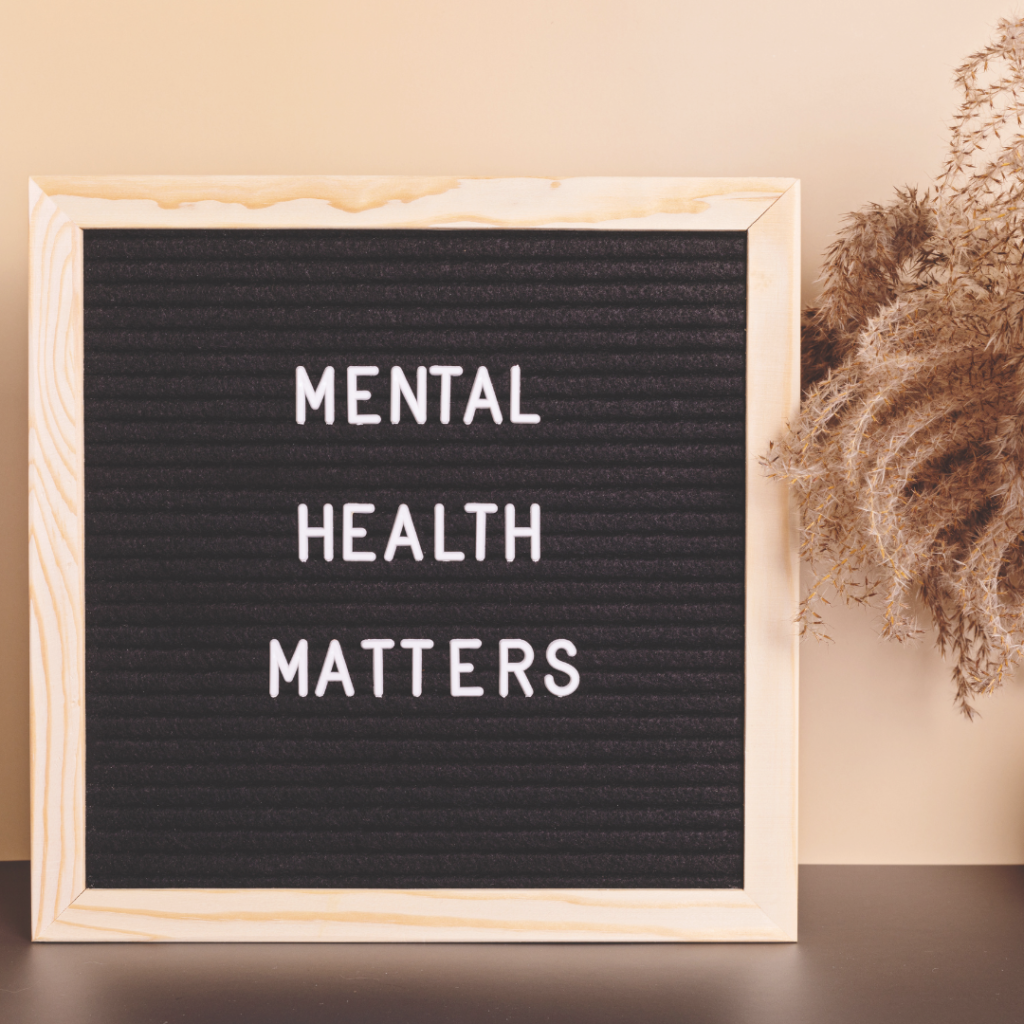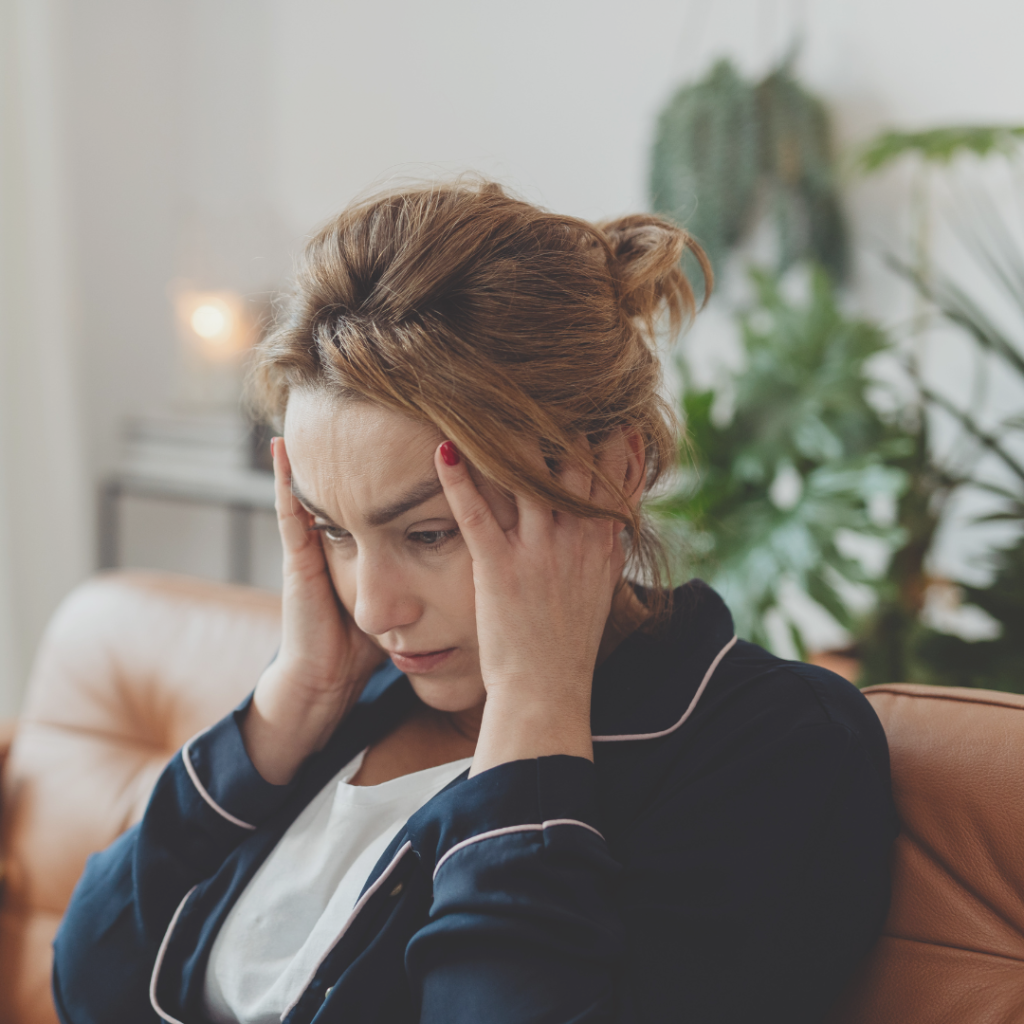Polycystic Ovary Syndrome (PCOS) is often discussed in the context of hormones and fertility—but there’s a major piece of the puzzle that can no longer be overlooked: mental health. More and more women are discovering that their mood swings, anxiety, and depression are not “in their head,” but instead rooted in the inflammatory and hormonal imbalances caused by PCOS.
In fact, studies show that women with PCOS are 77% more likely to experience anxiety, 53% more likely to have an eating disorder, and over twice as likely to suffer from depression compared to those without the condition ¹.
Table of Contents

Why Does PCOS Affect Mental Health?
The answer appears to lie in inflammation. It’s no surprise that women with PCOS report feeling bloated, “puffy,” or swollen—these are hallmarks of systemic inflammation. And inflammation doesn’t just affect your body; it affects your brain chemistry as well.
A notable study found that women with PCOS who were treated with metformin had a significantly reduced risk of developing bipolar disorder when compared to those who didn’t take it (HR: 0.36, 95% CI: 0.16–0.81) ². Those on hormone therapy also saw a reduced risk, though not as significantly (HR: 0.68, 95% CI: 0.35–1.32). This supports the idea that insulin resistance and inflammation—not just hormone levels—play a major role in PCOS and mental health.
The Cortisol-Inflammation Cycle

Stress, inflammation, and PCOS symptoms go hand in hand. During high-stress periods, cortisol levels spike, leading to an increase in testosterone and worsening PCOS symptoms.
This feedback loop creates a cycle of physical and emotional discomfort that many women feel trapped in.
Could Childhood Trauma Play a Role?

Surprisingly, research has shown a strong correlation between childhood trauma—especially emotional abuse—and the development of PCOS ⁵. These early experiences may disrupt neuroendocrine pathways, predisposing women to both hormonal and mental health disorders later in life.
Adding to this complexity, other research has found genetic links between PCOS and PTSD, suggesting that PCOS might not just be the result of external factors but also a contributor to mental health vulnerability ⁴.
Rethinking Mental Health Treatment for PCOS Patients

Many women with PCOS are misdiagnosed with mental health conditions without ever having their hormones checked. With a 70% misdiagnosis rate for PCOS, it’s essential that psychiatrists and mental health professionals screen for hormonal imbalances in patients who present with:
- Irregular periods
- Acne
- Hirsutism (excessive hair growth)
- Scalp hair thinning
- Obesity
Prescribing the wrong psychiatric medication can exacerbate PCOS symptoms and lead to unnecessary weight gain and worsened mental health. Providers should work closely with hormone specialists to determine whether PCOS is the root cause of a patient’s symptoms ³.
PCOS and Its Broader Impact

PCOS isn’t just a women’s issue—it impacts entire families. It’s the leading cause of infertility, and emerging data shows links between maternal PCOS and higher risk of ADHD and Autism Spectrum Disorder (ASD) in children ⁶. This adds a new layer of urgency to understanding and managing PCOS with a whole-body and mental health approach.
How to Choose a PCOS-Informed Mental Health Provider
When navigating both PCOS and mental health challenges, finding the right provider can make all the difference. Women with endocrine disorders—especially those with PCOS—have often been overlooked or misdiagnosed. In fact, PCOS has a 70% misdiagnosis rate, and many women are prescribed psychiatric medications without ever being screened for hormonal imbalances that may be driving their symptoms.
Before accepting a psychiatric diagnosis or treatment plan, it’s crucial to ask:
- Were your hormones thoroughly evaluated?
- Were you screened for PCOS before being prescribed medications that could potentially worsen your condition?
Mood swings, anxiety, and depression are all common symptoms of PCOS, and they may stem from underlying hormone dysfunction rather than a primary psychiatric disorder. Ruling out these organic causes first is essential to avoid unnecessary medication and to address the root issue—your hormones.
What to Look for in a Women’s Mental Health Specialist:
Psychiatrists and mental health providers should be trained to recognize the signs of PCOS, particularly in premenopausal patients. If you’re experiencing irregular periods, excessive hair growth (hirsutism), acne, hair thinning, or unexplained weight gain, a PCOS-informed provider will understand that these symptoms may point to hormonal imbalances—not simply side effects of psychiatric medications.
Unfortunately, misattributing these symptoms can lead to the prescription of medications that not only miss the mark but also exacerbate PCOS symptoms and weight gain. At PCOS-aware practices, we’ve seen many patients significantly improve—or even discontinue—their psychiatric medications after properly treating the underlying PCOS.
A referral to an endocrinologist or PCOS specialist such as PCOS Sisters is often a wise step in these cases, helping ensure both your mental and physical health are supported holistically. Remember: your PCOS is real, and it deserves care that considers your whole health—including your mind.
Recommended Mental Health Support for PCOS

If you haven’t found a provider who truly understands the hormonal roots of your mental health symptoms, you’re not alone—and you’re not crazy.
We highly recommend Luna Joy, a telehealth clinic focused on women’s mental health. They offer psychiatric care and counseling, accept insurance, and are available throughout the U.S.
FAQ: PCOS & Mental Health Link
1. Can PCOS cause mental health issues like depression or anxiety?
Yes, women with PCOS are significantly more likely to suffer from anxiety, depression, and eating disorders due to hormonal imbalances and systemic inflammation.
2. How does metformin help with mental health symptoms in PCOS?
Metformin improves insulin sensitivity and reduces inflammation, which has been linked to a decreased risk of developing bipolar disorder and possibly other mental health conditions in women with PCOS.
3. Is childhood trauma linked to PCOS?
Yes, emotional abuse in childhood has been independently associated with a higher risk of developing PCOS later in life.
4. Can psychiatric medications worsen PCOS?
Some psychiatric medications can worsen symptoms like weight gain and insulin resistance. It’s important to work with a provider who understands PCOS and can tailor treatment appropriately.
5. Does PCOS affect my children’s health?
Emerging studies suggest that children born to women with PCOS may have a higher risk of ADHD and ASD, highlighting the broader generational impact of the condition.
References:
- Cost of mental health disorders linked with polycystic ovary syndrome almost $6 billion in 2021 | Endocrine Society
- PCOS Carries Increased Risk for Bipolar Disorder, Risk Reduced with Metformin – MGH Center for Women’s Mental Health
- Frontiers | Polycystic Ovary Syndrome and Psychotic Disorder
- Assessing the Potential Causal Relationship between Polycystic Ovary Syndrome and Post-Traumatic Stress Disorder: A Bidirectional Mendelian Randomization Study
- https://www.sciencedirect.com/science/article/abs/pii/S0145213422003659
- Polycystic Ovary Syndrome Is Associated With Adverse Mental Health and Neurodevelopmental Outcomes | The Journal of Clinical Endocrinology & Metabolism | Oxford Academic
- Physical activity and mental health in women with Polycystic Ovary Syndrome | BMC Women’s Health | Full Text





